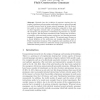Free Online Productivity Tools
i2Speak
i2Symbol
i2OCR
iTex2Img
iWeb2Print
iWeb2Shot
i2Type
iPdf2Split
iPdf2Merge
i2Bopomofo
i2Arabic
i2Style
i2Image
i2PDF
iLatex2Rtf
Sci2ools
125
click to vote
EELC
2006
2006
Unify and Merge in Fluid Construction Grammar
Research into the evolution of grammar requires that we employ formalisms and processing mechanisms that are powerful enough to handle features found in human natural languages. But the formalism needs to have some additional properties compared to those used in other linguistics research that are specifically relevant for handling the emergence and progressive co-ordination of grammars in a population of agents. This document introduces Fluid Construction Grammar, a formalism with associated parsing, production, and learning processes designed for language evolution research. The present paper focuses on a formal definition of the unification and merging algorithms used in Fluid Construction Grammar. The complexity and soundness of the algorithms and their relation to unification in logic programming and other unification-based grammar formalisms are discussed.
EELC 2006 | Fluid Construction Grammar | Human Natural Languages | Languages | Unification-based Grammar Formalisms |
| Added | 22 Aug 2010 |
| Updated | 22 Aug 2010 |
| Type | Conference |
| Year | 2006 |
| Where | EELC |
| Authors | Luc Steels, Joachim De Beule |
Comments (0)

